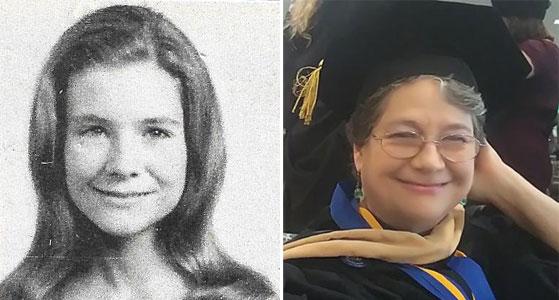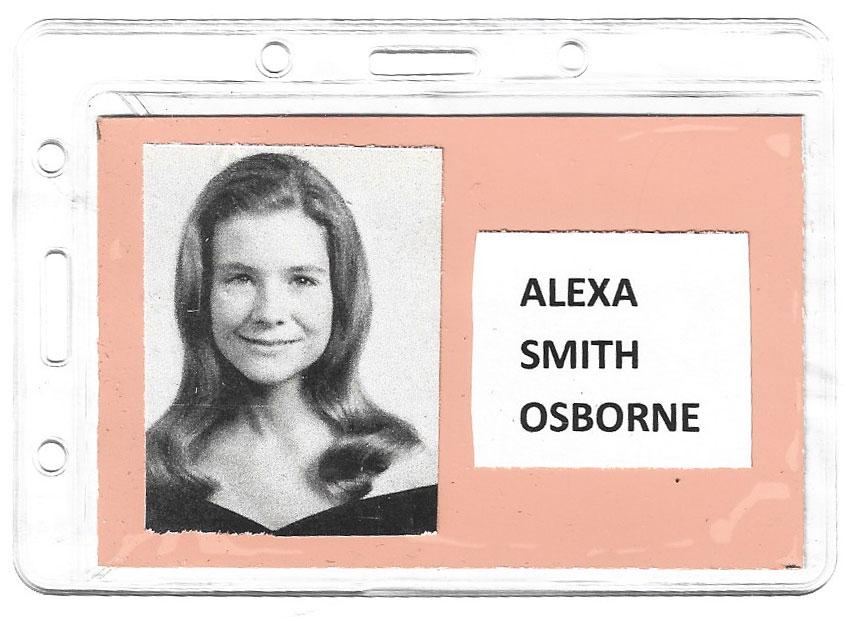My Story from Alexa Smith-Osborne, A&S 1974

My Story
by Alexa Smith-Osborne

The college choice decision was not an easy one. I had strong ties to Virginia, for a highly transient Army brat. I had been in All State Band, represented at Girl’s State-Virginia, led the Fairfax County Future Teachers of America, won the Virginia Citizenship Award, and been my class’s high school valedictorian. I had been recruited by the Ivy League (Princeton) and the Ivy League of the South (University of Virginia), both of which had recently begun to admit undergraduate females. Princeton brought me to visit their lovely historic campus: ivied dorms, renowned classes, and glorious library/rare manuscript collection. Ultimately, the innovative curricular options of the Echols Scholar program, the more diverse student body, and the significance of being a pioneer in co-education carried weight in my decision to attend UVa. The lack of sororities--which to me, as a white girl, were symbolic of patriarchy and racism--was also a plus.
We set foot for the first time on the Lawn when hundreds of students were occupying it during the Strike. My career Army father had been one of the first 1000 military advisors sent to Vietnam by JFK, so I was afraid my parents would turn around and take me back home! However, without revisiting our Vietnam debates, my father calmly (and my mother, less calmly) ushered me through the entry process and on to the co-ed Watson Dorm, where I met my suitemates, feeling full of enthusiasm for this grand adventure.
As an Echols Scholar, my first semester courses were mainly at the junior/senior level, so I was often the only female in a class with a very senior faculty member. Since I immediately had the new experience of faculty declining to call on me, I decided to make myself visible and my cohort’s voices heard by joining a faculty/student curricular committee, being sure to dress appropriately for meetings in my best mini-skirt and knee-high boots.
I joined the orchestra and pep band, auditioned unsuccessfully for the University Singers, and got my exercise by jogging from Watson to classes; it seems the University had placed the new Echols Scholars in the dorm farthest away from the classroom buildings! That worst thing about that was running to make it to my 8 a.m. Early American Lit class in time to review the sermons of Cotton Mather without benefit of morning coffee.
When I decided to enter the Maas French Essay Contest, my suitemate and fellow BSU folk team member, Dale Hill, rolled her eyes and opined that I was destined for the Ivory Tower. I took first prize in that contest for a comparative analysis of Camus’ L’Etranger and Faulkner’s Light in August. The English Department recruited me into their Ph.D. program, so I added more foreign language courses with the intention to specialize in Comparative Literature-the 19th Century Novel. This trajectory was consistent with earlier career interest in teaching, as evidenced by completing an internship at the National Education Association in high school.
However, when my brilliant (white, male) faculty mentor failed to earn tenure, I reassessed the odds of being successfully launched from the Department into academia and achieving tenure. The Career Center was helpful in providing standardized vocational testing, which led me to interviewing the Library Director about a career in library science, specializing in university rare book collections, and to interviewing the Hospital Social Work Director about a career in social work, and taking her sociology
class (including a field trip to a Black-owned farm, purchased by their formerly enslaved ancestors during Reconstruction). The Echols Scholar Program made it possible to maintain my English major while adding a double minor in Psychology and Sociology.
I was elected to Phi Beta Kappa, completed a thesis on “The Role of the Miracle in the Gospels and European Fairy Tales”, and graduated a year early so I could marry “the boy next door” back home. I earned an M.S.W., specialization in public health, had 4 children, then returned to complete a Ph.D. I was active in professional association leadership, receiving a Lifetime Achievement Award. I was inducted as a fellow of the Society for Social Work Research and retired from academia in 2017 as tenured full professor holding an endowed chair in mental health research. I am still in private practice, and providing clinical supervision, consultation, and peer review of research manuscripts and grant proposals.
To quote Melanie’s lyrics in Brand New Key, “Some people say I’ve [we’ve] done all right, for a girl.”

